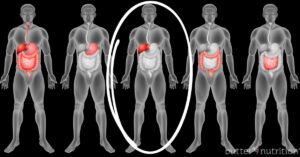
Contrary to popular belief, heartburn is actually a common symptom of not having enough stomach acid (a.k.a. hydrochloric acid), and not for having too much as you've been led to believe.
According to Dr. Jonathan Wright, "Since 1976, I've checked literally thousands of individuals with "heartburn" and indigestion for stomach acid production using a commercially available, extremely precise, research-verified procedure. Over-acidity is almost never found, especially in those over age 35."
Instead, it's estimated that 90% of Americans have low stomach acid.
While in the short term your acid blocker may give you immediate heartburn relief, what are you doing to your digestion and the rest of your body in the long run? Heartburn meds turn off your most important digestive tools, leading you down the path of malnourishment, aging, and eventually disease. So it makes a lot of sense why often on the back of these medications, you may notice they are often only labeled for 14 days of use.
"When you get past 35, 40, 45, and start to develop indigestion, it's highly likely that the indigestion is due to a weaker stomach, not a stronger one, a stomach making less acid, less pepsin. The very word "indigestion" implies lack of digestion, not overdigestion." - Dr. Jonathan Wright
The big questions remains, then why are doctors recommending acid blockers?
According to Chris Kresser, "Drugs for acid reflux and GERD are cash cows for the pharmaceutical companies. More than 60 million prescriptions for GERD were filled in 2004. Americans spent $13 billion on acid stopping medications in 2006. Nexium, the most popular, brought in $5.1 billion alone - making it the second highest selling drug behind Lipitor." [3]
Good Health Depends On Strong Stomach Acid
Strong stomach acid is a precursor for good health. It is an incredible substance that helps keep you healthy and youthful by creating a highly acidic pH of 1.5-3 in your stomach. Remember when you were a kid and you could eat and digest anything? That was in large part due to your high metabolism and strong hydrochloric acid levels - a very good reason not to self-induce inadequate hydrochloric acid with the use of acid blockers. Acid production typically slows with age, poor nutrition, and a slowed metabolism, but millions around the globe are doing it on purpose with over the counter meds!
It's also required for the absorption of important vitamins and minerals, as well as the breakdown of your proteins so that they can be properly absorbed. If you can't actually break down and absorb your food, it can't be USED to nourish your body, which creates a large problem, considering nutrition affects EVERY cell in your body. The health of your cells is dependent on nutrients. Cells create tissues, tissues create organs, and you are made up of a system of organs. If your digestion is inadequate, the integrity of each cell, tissue, and organ in your body will suffer, thus opening you up to a host of health problems. And that's just the tip of the iceberg...
Why are acid blockers/suppressors harmful?
- Increased cancer risk:
- "There appear to be at least two major mechanisms by which hypochlorhydria and achlorhydria elevate the risk of stomach cancer: by raising gastrin levels (hypergastrinemia), and by promoting bacterial over-growth." -Dr. Jonathan Wright [4]
- "In principal, current [acid-suppressing drug] therapies might be advancing the cancer clock by converting relatively benign gastric inflammation into a more destruction, premalignant process." Julie Parsonnet, M.D., Stanford University of Medical School [4]
- "Taking PPIs is associated with a small excess of cause specific mortality including death due to cardiovascular disease, chronic kidney disease, and upper gastrointestinal cancer." [7]
- Increased likelihood of dementia:
- Those who take PPIs are 44% more likely to suffer from dementia, according to this study from JAMA Neurology [5]
- Bad breath:
- Because food doesn't move as efficiently out of the stomach, it can decay in there, and bacteria levels can increase which can cause bad breath
- Digestive distress/bloating:
- Acid blockers set off the digestive cascade with an incorrect pH leading to no bicarbonate/enzymes/incomplete digestion in the small intestines causing intestinal problems
- Increased kidney disease risk:
- Increased risk of infection:
- Reduced stomach acid weakens the first line of defense against pathogens in the stomach
- Reduced absorption of nutrients, namely:
- B12
- Iron
- Zinc
- Folate
- Calcium (increasing hip fractures)
- Depression:
- "I am convinced that in a large percentage of cases, depression is the result of a neurotransmitter deficiency which is most often due to low stomach acid. In over 50 percent of cases, depression is treatable by supplying (relatively) large quantities of the essential amino acids." -Dr. Jonathan Wright [4]
What is really behind heartburn?
Research tells us some important things about what is really behind heartburn and acid reflux.
First, Helicobacter pylori infection (commonly called h-pylori) of the stomach suppresses stomach acid secretion. [8] H-Pylori is incredibly common. In fact, it comes back on most of the GI Map (stool tests) I run on my clients. It's estimated that over 50% of the world is infected with this chronic bacterial pathogen. [9] The research between h-pylori and gastroesophageal reflux disease (GERD) is very strong. [11, 12]
When stomach acid secretion is suppressed, it creates the perfect environment for bacterial overgrowth conditions in the GI tract. Without adequate stomach acid keeping invaders out and digestion in tip top shape, opportunistic bacteria can have a party in your gut manifesting in conditions like irritable bowel syndrome (IBS) and small intestine bacterial overgrowth (SIBO).
Bringing this full circle, research shows an increased prevalence of those with IBS also having GERD. [10]
Additionally GERD symptoms can also be caused by bile acid reflux, which often presents with the same symptom presentation. Bile is a fluid made the liver, stored in the gallbladder, and released into your small intestines in tandem with the digestive process. This fluid can reflux from the small intestines into the stomach causing similar symptoms.
Bottom line, chaos in your liver and gut axis (via h-pylori and/or overgrowth conditions = increased likeliness of heartburn symptoms as well as acid reflux and gastroesophageal reflux disease (GERD).
What to do?
First of all, consult your doctor and do not take this post as medical advice. While heartburn is actually more likely caused by a decrease in stomach acid (not too much), this is not something your typical mainstream medicine doctor will address.
Second, assess what is going on in your gut with comprehensive stool testing (I recommend and use the GI Map with my clients). The GI Map will give you some really good information about how much H-pylori is hanging out in your gut as well as if you have gut imbalances suggestive of those found in SIBO.
Another great thing to do would be to assess your mineral levels with hair analysis to see if the medication has causes any nutritional deficiencies that need to be addressed. That way you can find out the nutritional support your body needs most.
Lastly, if you suffer from heartburn, you may want to try this natural remedy: try to drink less fluids with your meals (more fluids=more diluted stomach acid=higher stomach pH instead of the acidic low pH that you want). Instead, try add 1-2 tablespoons of raw apple cider vinegar diluted with ¼-½ cup water and consume with your food. This can help to temporarily increase your stomach acid to help you digest your food more efficiently, and prevent heartburn while you work on fixing the root cause of heartburn (hint: your gut).
If you're looking for more ways to understand and improve your gut, you'll want to check out the: How to Build a Bulletproof Gut Masterclass.
PIN IT:
References:
1. http://www.life-enhancement.com/magazine/article/212-how-to-accelerate-aging
2. http://www.npr.org/sections/health-shots/2016/01/11/462423759/popular-acid-reflux-drugs-are-linked-to-kidney-disease-risk
3. http://chriskresser.com/what-everybody-ought-to-know-but-doesnt-about-heartburn-gerd/
4. Why Stomach Acid is Good for You by Jonathan Wright, MD and Lane Lenard, PhD M. Evans and Company
5. http://archneur.jamanetwork.com/article.aspx?articleid=2487379
6. http://www.slashgear.com/popular-heartburn-medicine-may-be-linked-to-dementia-16427260/
7. https://www.bmj.com/content/365/bmj.l1580
8. https://pubmed.ncbi.nlm.nih.gov/9207257/
9. https://pubmed.ncbi.nlm.nih.gov/8547526/
10. https://europepmc.org/article/med/11873099
11. https://www.ncbi.nlm.nih.gov/pmc/articles/PMC6502218/
12. https://www.ncbi.nlm.nih.gov/pmc/articles/PMC3481226/








Mary says
But what else can you do to increase stomach acidity when you just can’t stand to drink the vinegar and water?
Catherine says
Hi Mary,
You can get gut testing and find out the root cause.
Abundantly,
Catherine
Nina says
Ok, and then? This article is lacking direction. I read all the way through it to find out exactly nothing. So we have done the stomach testing and there is a disbalans, now what? Would be really helpful to actually offer some solutions or ways on how to address it.
Catherine says
Hi Nina,
The direction depends on what is going on in the gut, which is different for everyone. You can find more generic gut health suggestions here, but remember it's better to test and not guess.
Abundantly,
Catherine